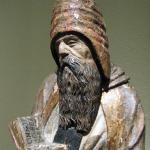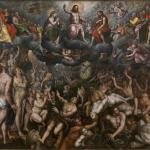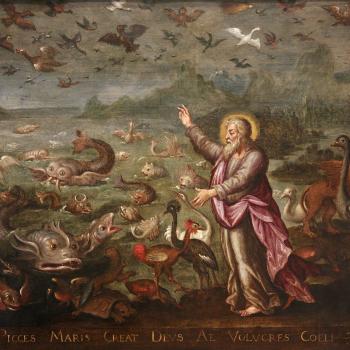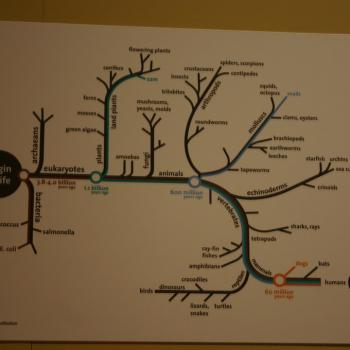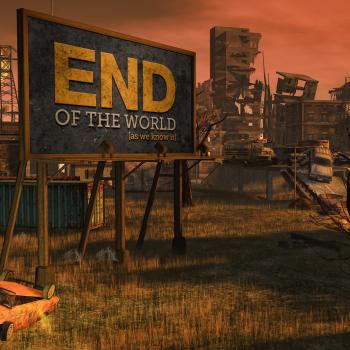
In the introduction to the book I am currently reading, Prayer of the Heart, the author, Fr. George Maloney, a writer I greatly respect for his knowledge and wisdom, wrote something which I found to be greatly mistaken:
Only a human person, of all God’s material creatures, has the ability to stand on the mountaintop of his or her consciousness and ask the why and where of human existence. Why have I been created? Where is my life going? Where should it be going? How can I find purpose in my life?
The notion that humanity is the only material creature, the only animal, which can and will ask these, and other similar, questions, is one which many believe. It is an assumption which many Christians accept without question. I am not one of them. I have grown to question it, even if many of my favorite theological and spiritual writers tend to accept it as a given and through it, produce extremely anthropocentric theological system. When they do so, I tend to deconstruct those systems and take the good from them while casting aside what I believe to be false. Indeed, while there are exceptions to the rule, they represent what has become the Christian norm, and those who support this norm often try to base it on their reading of Scripture, a reading which does not always follow as they think it does. For, as they point out, Scripture says humanity was made in God’s image and likeness; this certainly is true, and all Christians should hold that belief; nonetheless, the problem is how they turn that statement into something which Scripture does not say, that is, only humanity is made in God’s image and likes. They add “only” to a text which does not say only, similar to the way some have come to read Paul as saying “faith alone” is what saves, even though Paul never said “alone.”
While, it must be acknowledged, many in Christian tradition believe only humanity is made in God’s image and likeness, it is clear they are being influenced by their own cultural background, their own cultural understanding of other forms of animal life, one which had a limited understanding of the potentiality found in such other forms of animal life. That is, as all of us do, they engaged Scripture based upon factors outside of Scripture, factors which can be and should be reformed. But once they did this, then they took their belief and used it in the way they read or engaged science, creating a never-ending circle based upon a bad hermeneutical foundation, one which led them to believe many qualities associated with humanity, such as its intellect, come from the way they represent God and so is exclusive to humanity.
Scientifically, there seems to be a variety of intellectual potentials found throughout the range of animal life (and possibly, not just animals). Some animals have greater intellectual capabilities than others. Some demonstrate conscious awareness of death and act upon in in ways which prove that humanity is not alone in the way it engages death. We can see this in various species closely related to humanity, like Neanderthals, but also in others, like elephants, who seem to have rituals connected with death, or with other animals which clearly are in mourning when they lose a loved one (as many of those who inherited a pet from a loved one has likely observed). To be sure, not all animals show the same level awareness, suggesting that, as with the intellect itself, we are likely dealing with a spectrum of potentiality, with some much more aware, much more affected by death than others. Of course, we can appreciate and understand those animals which act in ways similar to us much more easily than those which act in ways quite a bit different from us, and so we might be misreading those who are different: they might have ways we cannot appreciate or understand that for them represent their own engagement with death. It is also possible that some animals truly have little to no understanding of death beyond the instinct for survival. What we should not do is use those we cannot understand and use them to suggest the conclusion that only humans have the ability to think about and ponder about life and death.
Nonetheless, though science suggests one thing, and much of Christian tradition suggests another, once again, it is clear, many do not want to reform Christian tradition to take in what science has revealed. They think it takes away what makes humanity special, and indeed, this is a part of the problem: people want to feel they are special – special as individuals, as communities, and as a species, and so they try to find ways to prove they are not only special, but superior to others. That is, pride is at work in the way they look out into the world. And it such pride which has them turn various qualities they possess into exclusive ones, for by doing so, their pride validates itself. This tendency seems to be a byproduct of the fall, that is, it is the type of egotism which the fall generates, one which seeks to divide up creation so as to make one part of it better than others, and then, having made it better, justify whatever it does to the others, even if it means destroying that which is deemed inferior. That is, sin has us divide up creation so we can join in its destruction of being. Individualism, racism, nationalism, and even religious fundamentalism, all come as a result of this tendency. They are all opposed to the way of Christ because Christ has shown us that the distinctions found in creation are not meant to serve as qualities which divide creation into distinct parts cut off from each other, or fighting each other, but rather as parts which are interdependent with each other and come together as one. This is why it is said in Christ there is to be neither male nor female, Jew or Gentile, not because those qualities do not take place, but because those qualities and distinctions are not absolutes; while sin divides up creation through them, Christ finds a way to bridge everything together, to make them one, even as God is one.
This is not to say there are no distinctions to be found in the world. It’s not distinctions which are in question, but how they are understood and applied, which is problematic. Distinctions are not meant to be absolutes, separating those which are distinct from each other, but rather, are to serve as the way we establish how different people and things can exist in relation with each other. That relationship is important. It shows they are not independent but rather interdependent. Those persons and things, those objects which serve as the basis for such relationships, will have qualities which make each of them unique, qualities which emerge and come to be as a result of those relationships. For Christians, the Trinity should help them better understand this point, for in it, we have a plurality of persons, each unique in their own way, and yet each connected with and full equal with every other one, showing us uniqueness does not have to be seen as representing an essential difference, nor as making one or another better than another. This should help us better understand humanity and our place in creation. We can accept there is something unique about humanity while not using it to produce a cosmological understanding that makes humanity special or greater than all other material beings.
It can be said that one of the distinctions given to humanity, one of the things which made it unique, is that the incarnation took place with it, that is, God took on human nature and through it, become a man, Jesus Christ. Because distinctions come from and through relationships, this distinction should not be used to suggest the incarnation is only for the sake of humanity, but rather, it is the means, the relational center, God uses to bring salvation to all creation. Thus, humanity can be said to be unique because of the incarnation, and not because it has exclusive claims to possessing an intellect, self-consciousness, or awareness of death.
Yes, I know some of my argument could be used against me, that is, because we cannot and do not know what is going on in the consciousness of other animal species, I could be wrong in suggesting that they have some level of self-awareness and even an understanding of death. While, for some animals, this might be true, we have found the means to observe and learn from others that they have some understanding about death and have rituals associated with it. Perhaps some species have that awareness, and others do not. Perhaps. But to say such an ability is exclusive to us I think can be shown to be wrong. I would also say the instincts most animals have in regards self-preservation (or those who look for and take care of their own youth, with a willingness to sacrifice themselves so that their children can survive) demonstrate that they all have some awareness of death, even if it is not the same kind we have. And if this is true with death, this can also be true with other concepts; animals are going to want to understand, at least in regards their potential, their own origin, why they exist, and indeed, the meaning of it all. This is not to say they will do so in the same degree, but then again, not all humans do so either. But, for me, the way I read the interactions of many saints with animals suggests that they had come to know and recognize some of these qualities with the animals they associated with, even those science has less ability to examine and understand, showing that the Christian tradition, in action, often transcended the notions which were handed down from generation to generation. I see this, for example, when St. Anthony of Padua preached to the fish: he had them celebrate and worship God, indicating he thought they had some sort of concept which they could and would use about God and their creation, and the way they responded to him, suggests he was right. I see similar stories with many other saints, including favorites like St. Antony the Great, St. Jerome, St. Francis of Assisi, and St. Seraphim of Sarov, each which are known to have encounters with animals which highlight such animals had some sort of understanding of God and praised God when asked to do so.
Just as many Christians have begun to understand salvation in a pluralistic, inclusivistic sense, so I think we must begin to explore creation with such a sense as well. We should stop looking at humanity, believing many of the qualities we associate with it are exclusive to it. Indeed, we should truly embrace pluralistic inclusivity as a hermeneutic for our engagement with others, be it other people, or other forms of life, for then, if we do so, we will find our actions will be transformed and made better, as we will better realize our ethical and moral obligations to the other. We will have cut out the way of thinking which leads us to think we can ignore them because we view them as different, and therefore, our inferiors. Then, we will find ourselves truly following the way of Christ, because we will no longer allow sin to lead us on to divide up the world and justify destroying that which we find to be different. Rather, we will see difference does not need to lead to absolute division, but rather, serve as the foundation for a new way of looking at things, where we realize our interdependence with everything, and therefore, the need to work together so that we lift everyone else up due to our relations with them instead of putting them down and excusing their destruction.
Stay in touch! Like A Little Bit of Nothing on Facebook.
If you liked what you read, please consider sharing it with your friends and family!
N.B.: While I read comments to moderate them, I rarely respond to them. If I don’t respond to your comment directly, don’t assume I am unthankful for it. I appreciate it. But I want readers to feel free to ask questions, and hopefully, dialogue with each other. I have shared what I wanted to say, though some responses will get a brief reply by me, or, if I find it interesting and something I can engage fully, as the foundation for another post. I have had many posts inspired or improved upon thanks to my readers.


